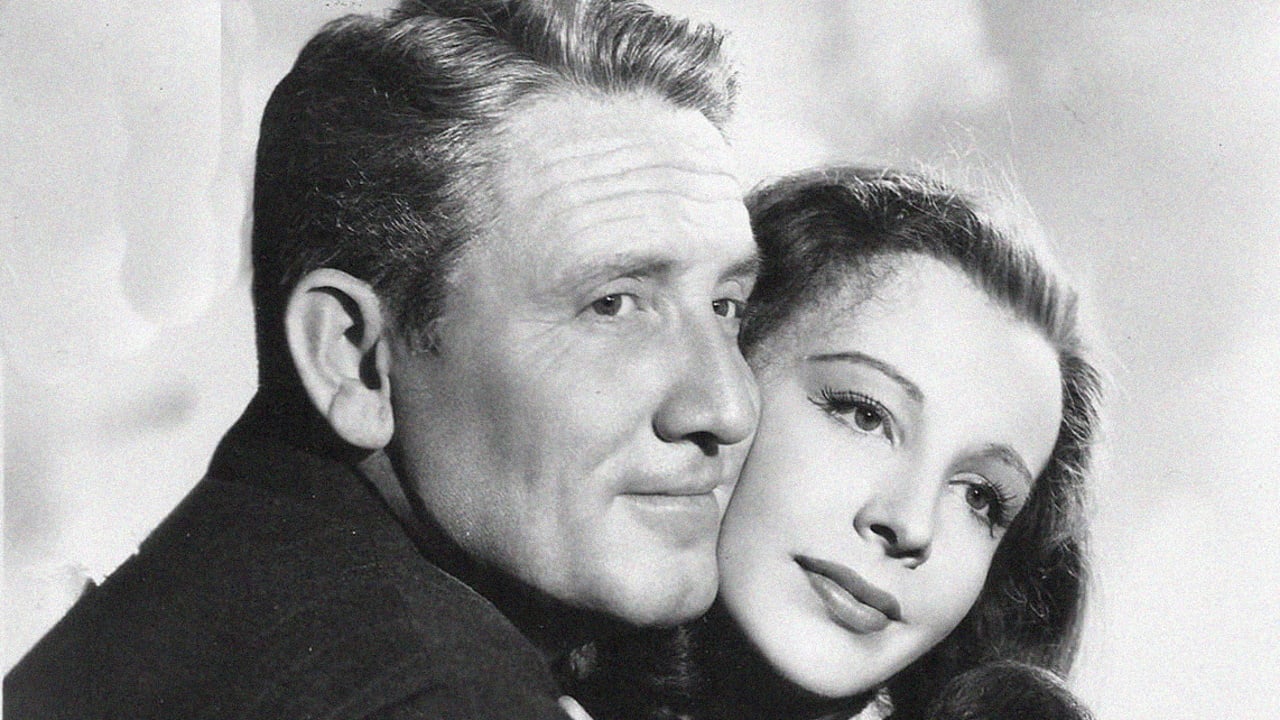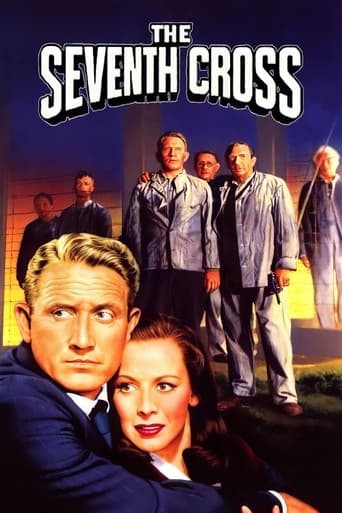Borgarkeri
A bit overrated, but still an amazing film
Usamah Harvey
The film's masterful storytelling did its job. The message was clear. No need to overdo.
Neive Bellamy
Excellent and certainly provocative... If nothing else, the film is a real conversation starter.
Erica Derrick
By the time the dramatic fireworks start popping off, each one feels earned.
Robert J. Maxwell
"The Seventh Cross." It sounds like one of those sword and sandal epics made at Cinecittá in the 1950s. "The Seventh Cross", starring Steve Reeves, Saltimbocca Galupo, and Bicchiera da Vino as the Queen of Sheba.Instead it's one of Fred Zinneman's understandably oppressive movies about seven escapees from a concentration camp in 1936. The narration tells us the fate of the fugitives. The Gestapo are hot on their heels. One by one they're caught and, it's hinted, crucified. Six crosses receive their victims. The seventh is reserved for Spencer Tracy, who slouches grimly through the movie, visiting places and people who might help, trying to get a place to sleep, enough money and forged papers to leave Germany, and -- above all -- those prison clothes he's wearing.It's not one of Tracy's better performances. The role rather restricts him. It's hard to put your tongue in your cheek and make wisecracks when your head is constantly at risk.Nice performances by supporting players. Hume Cronyn is fine as the cheerful factory worker who wants to help his friend, Tracy, but has his family to think about. The script gives him a pretty good job. Nineteen thirty-six was the Great Depression but Germany was rapidly pulling out of it, thanks to Hitler, who put everyone to work building weapons. Cronyn's wife, Jessica Tandy, is radiantly youthful, pretty in a way that's difficult to describe -- attractive, yes, but anaclitic too. She's more than what Hume Cronyn deserves. She's what I myself deserve. At any rate, she became Mrs. Cronyn in real life. Signe Hasso, as a femme de chambre, hits her marks as well, and she's sexy too.It's gloomy and in many ways depressing but the story is gripping too. The screenplay by Helen Deutsch doesn't give us many tag lines but generates a generous amount of suspense as the Gestapo close in on the errant Tracy and two independent forces try to help him but keep missing each other. It's a little odd for 1944. Not all the Germans go around goose stepping and giving the Hitler salute. Some of them resemble us normal people.I remember seeing it as a kid but recall only two images -- a Luger sliding into the mud and a man doing a swan dive from a high roof top. That was a long time ago, but the film is hard to forget.
Steffi_P
It has often been commented that the Hollywood motion picture got a lot grimmer and bleaker during the years of World War Two, as events round the globe (and the fact they were being filmed as they happened) brought out new cynicism and a willingness to portray the darker side of life. This is after all supposedly how film noir got started. But to a large extent this trend had its beginnings not in the gritty gangster movie but in pictures that dealt with wartime subject matter directly.Although it is set some years before the war began, The Seventh Cross is incredibly frank and accurate about the cruel and domineering nature of Nazism. But this is not just some gung-ho, bash-the-Germans propaganda piece, and nor is it as misanthropic as film noir. Far from it; The Seventh Cross dares to suggest, unusually for a picture made while the war was in progress, that there are many decent, thoughtful Germans amongst the bad. It also makes the very good point that what makes a dictatorship work is not just the evil intentions of a small minority, but also the naivety and indifference of a great many more people. Predictably the movie removes the direct references to the hero's socialist politics and replaces them with a dose of Christian rhetoric, but the story's warm, humanist message remains intact.A few problems (indeed the picture's only significant problems) lie in the structure of the screenplay. Much of the story is told by a voice-over, which is not necessarily a bad thing but in this case tends to disarm the on screen narrative. For example, Spencer Tracy is effectively mute for the first twenty minutes because the voice-over (a different character) is doing all his talking for him, revealing every thought process but giving us nothing of the man's character. And for a lead role he comes across as disappointingly bland. But perhaps even this fact has a silver lining, as it allows all the minor characters – some of them crucial to the overall work despite only having a minute or two of screen time – to shine through.Which makes this a good point to talk about the actors. The Seventh Cross features a bevy of excellent supporting players. Some of these, such as Agnes Morehead and Felix Bressart play simple walk-on, walk-off roles in spite of their stature at the time. But this is in many how it works; actors of that calibre are able to make an impression in a short space of time, which is exactly what the story requires. Best of the bunch is certainly Hume Cronyn, who gives us his usual simple nice-guy persona, and then shows us what happens when reality comes crashing in. It's a performance with realism, dignity and great emotion. As you might guess from the previous paragraph Spencer Tracy is not well-served by this screenplay, and is not called on to do much more than look sullen and mutter the odd word or two. But at least an actor like Tracy can pull that off with some degree of depth and presence, whereas a lesser player would have just been wooden.As for director Fred Zinnemann, much is often made of his background making documentary shorts, but I feel his experience in tense thrillers (which many of his early feature were) played an equal if not greater part in shaping his approach, especially to later gems such as High Noon and Day of the Jackal. As time went on Zinnemann would learn to reconcile the fast pacing of the thriller with his love of beauty and his intensely intimate style, the kernels of which can be seen here. The Seventh Cross contains a fair few point-of-view shots, putting us in the hero's shoes, but there are a number of other tricks too. Take for example the scene where Tracy blags is way into town carrying a couple of farming tools. There is a lengthy, tracking close-up of his face as he trudges along, while the noises of the stormtroopers and the barking of dogs goes on all around. This puts us right there with his fear of being caught and his need to be unobtrusive, and has a far stronger psychological impact than if it actually focused on his pursuers.The Seventh Cross is, from its opening shot of the row of crosses with a tiny sun trying to peep through the mist, an incredibly bleak-looking picture. There is something very painful in seeing the picture's message of hope amid all the darkness and squalor – it emphasises the fragility of that hope, and the true desperation of life in Europe at that time. And, in some way this is a very European-looking picture. By this I don't mean that it imitates European production styles, but that it is very hard to think that the cast and crew would not have set foot outside the US in making it. This is partly thanks to some devoted production design, and partly due to the large number of German-speaking refugees in bit roles. But it is also in some way down to its portrayal of Nazi Germany as a real place populated by real people – a society that had become sick, twisted and nightmarish to live in, but one in which could still be found that spark of human decency that can never been extinguished entirely.
Michael_Elliott
Seventh Cross, The (1944) *** 1/2 (out of 4) Hard hitting Ww2 drama has Spencer Tracy playing one of seven men who escape from a concentration camp. When the other six men are captured or killed, Tracy knows that the entire country will be looking for him so his desperate search for help grows more difficult. Whenever great WW2 films are discussed this one here hardly ever gets mentioned, which is a real shame because this film turned out to be a real gem that works on so many levels and once again features a great performance by Tracy. Zinnemann does a great job directing this film and what I loved most is the fact that Tracy's character is under constant threat of being captured and sent back to the camp. Tracy can't trust anyone and must take big risks in trying to reach out for anyone to help him and this here is perfectly captured by the director. There's a tense atmosphere running throughout the film and it's what I'd compare to a feather blowing in the wind. Tracy's performance has him, what seems like, floating through the air because we can feel the pain and terror in him of being caught. To make matters worse, he reaches his hometown where he must try and decide which of his former friends would help him and which would turn him in. Tracy's performance is very deep and intense but it seems as if he is walking on egg shells throughout the film and floating in the air. The way he moves about is something truly amazing to watch. Hume Cronyn and Jessica Tandy play a husband and wife who Tracy goes to for help. Cronyn nearly steals the film with his flawless performance. The only thing that hinders the film is some of the narration, which is a tad bit over the top at times.
ccthemovieman-1
Boy, this a grim story, but it gets you involved, especially if you tend to be a bit paranoid. The story centers around Spencer Tracy's character "George Heisler" hiding from the Nazis in 1936 Germany, not knowing who to trust.Although there's not much action, this is decently-paced with an unusual (and too corny) narrative from a dead man. The last 20 minutes, which should have been the most suspenseful of the film, instead wound up boring and too melodramatic.What I did find interesting was the very young couple of Jessica Tandy and husband Hume Cronyn. I had forgotten what a beautiful woman Tandy was when she was young. She and Hume were the best part of this film. Tracy, meanwhile, doesn't have a lot of dialog.The movie paints a horrible picture of pre-World War II Germany. There are several attempts to lift the spirits of the viewer as he watches this but overall it is a grim story of survival

